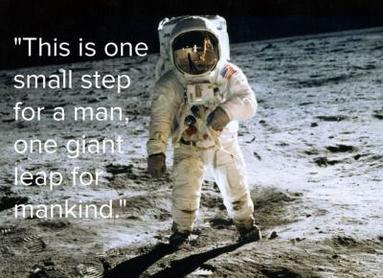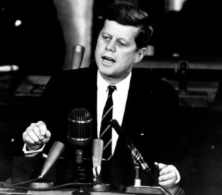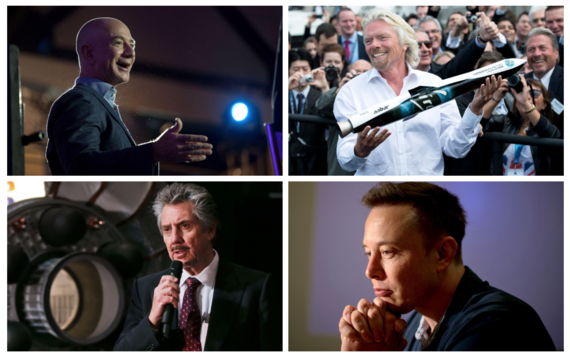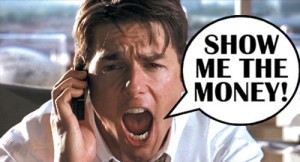[Image courtesy of Nasa]
47 years ago [20th July 1969] one giant leap for mankind was taken. Was it the direct result of President Kennedy's challenge to put a man on the moon before the decade was out? Excerpts of his Special Message, that he delivered in person before a joint session of Congress May 25, 1961, to the Congress on Urgent National Needs would suggest yes. This message at that time illustrated the challenges and solutions to innovation then, yet they are just as applicable in business today.
[Image courtesy of Nasa]
Finally, if we are to win the battle that is now going on around the world between freedom and tyranny, the dramatic achievements in space which occurred in recent weeks should have made clear to us all, as did the Sputnik in 1957, the impact of this adventure on the minds of men everywhere, who are attempting to make a determination of which road they should take.
Innovation, like travel, is about the journey not the destination, and the adventures and lessons you learn along the way. Just ask any entrepreneur of the level of determination it takes to walk that often lonely path.
Since early in my term, our efforts in space have been under review. With the advice of the Vice President, who is Chairman of the National Space Council, we have examined where we are strong and where we are not, where we may succeed and where we may not. Now it is time to take longer strides - time for a great new American enterprise - time for this nation to take a clearly leading role in space achievement, which in many ways may hold the key to our future on earth.
Innovation is both about research and working with experts as well as novices who see connects others do not. It requires identifying your strengths and limitations and addressing the latter whilst taking bold steps to reach a future that is possible for us. And space travel is such a big deal; some of the biggest names in entrepreneurship are taking on the challenge.
[Images courtesy of Washington Post: Top left: Blue Origin's Jeffrey P. Bezos (David Ryder/Getty Images) Top right: Virgin Galactic's Sir Richard Branson (Adrian Dennis/AFP/Getty Images) Bottom left: Bigelow Aerospace's Robert Bigelow (Julie Jacobson/AP) Bottom right: SpaceX's Elon Musk (Noah Berger/Bloomberg)
I believe we possess all the resources and talents necessary. But the facts of the matter are that we have never made the national decisions or marshalled the national resources required for such leadership. We have never specified long-range goals on an urgent time schedule, or managed our resources and our time so as to insure their fulfilment.
Many companies and organisations possess resources and talents, yet few are willing to show the level of leadership needed or set the long term goals necessary to innovate on solid ideas and execute them.
Recognizing the head start obtained by the Soviets with their large rocket engines, which gives them many months of lead-time, and recognizing the likelihood that they will exploit this lead for some time to come in still more impressive successes, we nevertheless are required to make new efforts on our own. For while we cannot guarantee that we shall one day be first, we can guarantee that any failure to make this effort will make us last. We take an additional risk by making it in full view of the world, but as shown by the feat of astronaut Shepard, this very risk enhances our stature when we are successful. But this is not merely a race. Space is open to us now; and our eagerness to share it's meaning is not governed by the efforts of others. We go into space because whatever mankind must undertake, free men must fully share.
Being the underdog is a great advantage at times because that can drive you and excel you more than being at the top of your game. Innovation is all about acknowledging the efforts that need to be made to execute. Yet innovators know they are not guaranteed success, they just know they cannot accept or live with not trying. They take the risks; the very risks that on occasion lead to greater success, particularly when merged with the concept of open source innovation, such as Elon Musk and Marcin Jakubowski illustrate by sharing the lessons learnt and enabling the world to benefit.
I therefore ask the Congress, above and beyond the increases I have earlier requested for space activities, to provide the funds, which are needed to meet the following national goal.
Now for the crunch bit, even allowing for the concept of frugal innovation, which is very effective, innovation requires money [and time] to be invested for innovation to occur.
First, I believe that this nation should commit itself to achieving the goal, before this decade is out, of landing a man on the moon and returning him safely to the earth. No single space project in this period will be more impressive to mankind, or more important for the long-range exploration of space; and none will be so difficult or expensive to accomplish. We propose to accelerate the development of the appropriate lunar spacecraft. We propose to develop alternate liquid and solid fuel boosters, much larger than any now being developed, until certain, which is superior. We propose additional funds for other engine development and for unmanned explorations-explorations which are particularly important for one purpose which this nation will never overlook: the survival of the man who first makes this daring flight. But in a very real sense, it will not be one man going to the moon-if we make this judgment affirmatively, it will be an entire nation. For all of us must work to put him there.
Businesses and organisations that commit to achieving specific goals need to have a solid purpose and direction yet blend this with the ability to pivot when an unforeseen opportunity presents itself. Remember Viagra started as a drug for heart conditions, yet it made money and is known for; well let's call it one of its side effects.
Innovation can be difficult, time consuming and costly with no guarantee of success. Yet with a goal it can be broken down into more bite-sized chunks. You eat an elephant one bite at a time. We have to acknowledge that innovation is not about being risk averse, but pays due regard to the safety of humans; those actions illustrate our humanity. And that a team effort is essential, so everyone has to work to make it happen.
During a visit to the NASA space center in 1962, President John F. Kennedy noticed a janitor carrying a broom. He interrupted his tour, walked over to the man and said,
"Hi, I'm Jack Kennedy. What are you doing?"
"Well", Mr. President, the janitor responded, "I'm helping put a man on the moon".
Secondly, an additional 23 million dollars, together with 7 million dollars already available, will accelerate development of the Rover nuclear rocket. This gives promise of some day providing a means for even more exciting and ambitious exploration of space, perhaps beyond the moon, perhaps to the very end of the solar system itself.
The act of innovation can be a catalyst that at times can surpass it's own initial expectation, because we don't know what we don't know at the beginning and hence can't see all the options.
Third, an additional 50 million dollars will make the most of our present leadership, by accelerating the use of space satellites for worldwide communications.
Quite simply without developing word-wide communications we might have got Neil Armstrong to take that giant leap for mankind, we would never have seen or heard it. That too was a major innovation.
Fourth, an additional 75 million dollars-of which 53 million dollars is for the Weather Bureau-will help give us at the earliest possible time a satellite system for world-wide weather observation.
Every time you look up what the weather will be like, remember someone had to think up the science to be able to predict it [even allowing for the times they get it wrong].
Sometimes wicked challenges with audacious goals require substantial investment. Innovation requires in the words of Jerry Maguire to,
[Image courtesy ofhttp://www.sonypictures.com]
Let it be clear-and this is a judgment which the Members of the Congress must finally make - let it be clear that I am asking the Congress and the country to accept a firm commitment to a new course of action, a course which will last for many years and carry very heavy costs: 531 million dollars in fiscal '62-an estimated seven to nine billion dollars additional over the next five years. If we are to go only half way, or reduce our sights in the face of difficulty, in my judgment it would be better not to go at all.
Substantial investments cannot be made half-heartedly - with innovation either you're in or you're out. Thomas Edison put it nicely:
I have not failed. I've just found 10,000 ways that won't work
Now this is a choice which this country must make, and I am confident that under the leadership of the Space Committees of the Congress, and the Appropriating Committees, that you will consider the matter carefully.
Innovation requires leaders to make carefully considered decisions in business. Yet carefully considered is not always about solely focusing on the bottom line, because focusing on the triple bottom line enable the wider purpose of the venture to be grasped.
It is a most important decision that we make as a nation. But all of you have lived through the last four years and have seen the significance of space and the adventures in space, and no one can predict with certainty what the ultimate meaning will be of mastery of space.
Innovators are those who can see the significance of the endeavour and can readily accept the uncertainty of the end result.
I believe we should go to the moon. But I think every citizen of this country as well as the Members of the Congress should consider the matter carefully in making their judgment, to which we have given attention over many weeks and months, because it is a heavy burden, and there is no sense in agreeing or desiring that the United States take an affirmative position in outer space, unless we are prepared to do the work and bear the burdens to make it successful. If we are not, we should decide today and this year.
Innovators make the decision that they are prepared to do the work and bear the burdens to make their dream a reality. And this they need to have considered and fully aware of, ideally prior to taking the first step.
This decision demands a major national commitment of scientific and technical manpower, material and facilities, and the possibility of their diversion from other important activities where they are already thinly spread. It means a degree of dedication, organization and discipline, which have not always characterized our research and development efforts. It means we cannot afford undue work stoppages, inflated costs of material or talent, wasteful interagency rivalries, or a high turnover of key personnel.
Innovation is about diverting from certain aspects of life and business to achieve those aspects that we value more. Innovators have to be dedicated, organized and disciplined to do what it takes to get the job done and recognise the limitations of past behaviours. They must understand what has to happen and simultaneously what must not happen.
New objectives and new money cannot solve these problems. They could in fact, aggravate them further -unless every scientist, every engineer, every serviceman, every technician, contractor, and civil servant gives his personal pledge that this nation will move forward, with the full speed of freedom, in the exciting adventure of space.
And that's what innovators do. They pledge their life to their mission. The great ones get their teams to see, feel and taste the vision. Then once they do they give their team members the freedom to do what they are capable of; empowering them to excel, and in doing so become part of the adventure and giving their life meaning and purpose too.
We know that innovators rise to the challenge. We can see that today in the responses to and successes of projects that do just that, such as SpaceX, HeroX, Skild, MITinclusiveinnovation, Thiel Fellowship and the Bill & Melinda Gates Foundation's Grand Challenges to name a few. Challenges are not a new concept. We learn to take on challenges right from childhood. The moment a friend dares us to do something. That moment where we simultaneously feel full of fear and yet draw on our internal courage and be brave and take on that dare.
And writing this I'm wondering about the power of a challenge. What if President Kennedy had never thrown such a challenge on the table? Would Neil Armstrong ever have taken that step?



